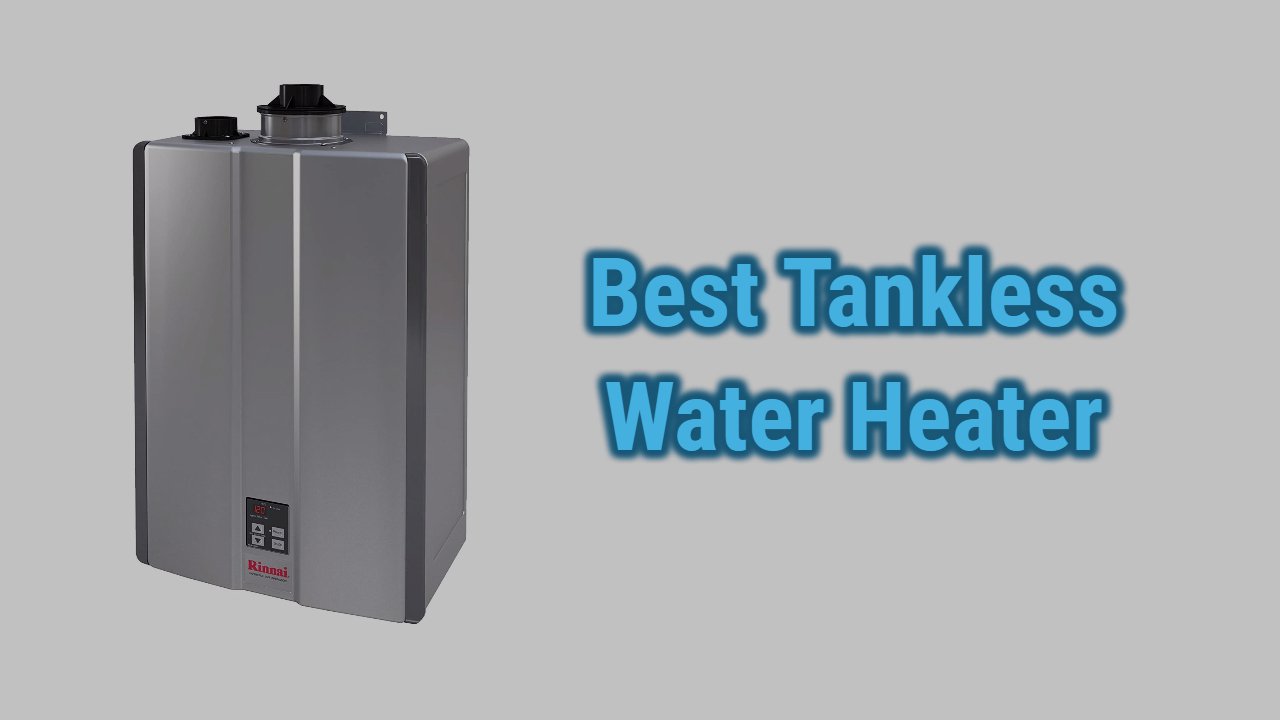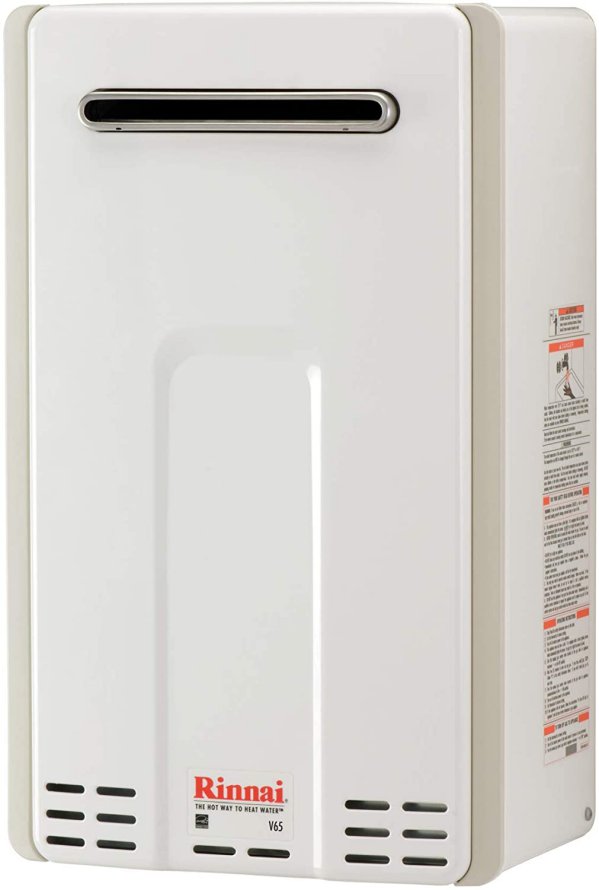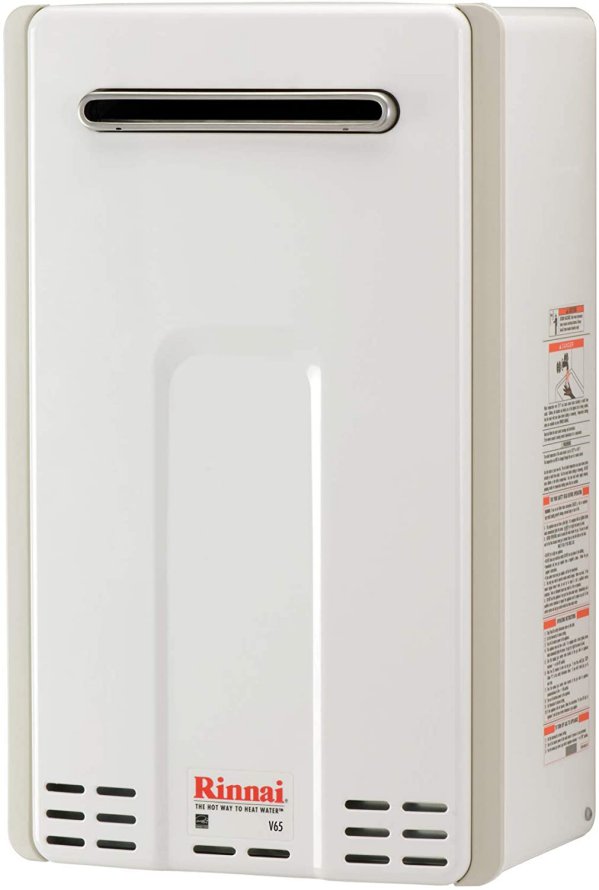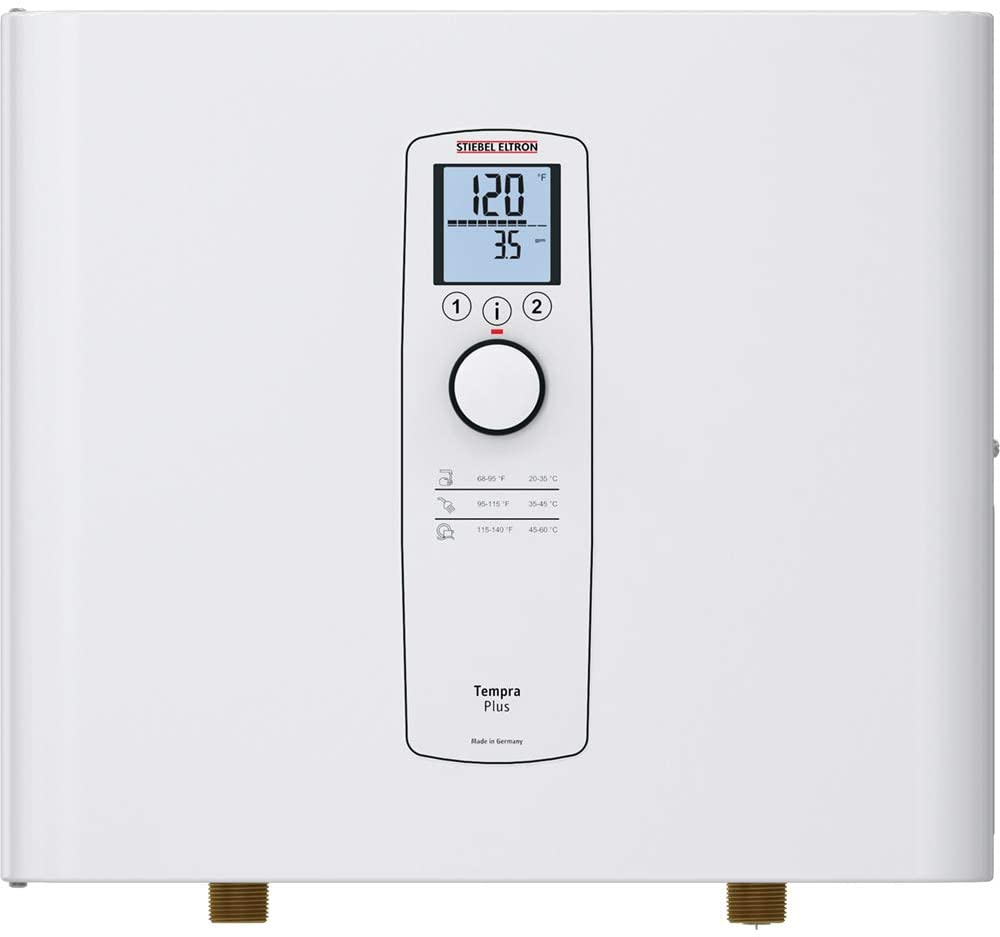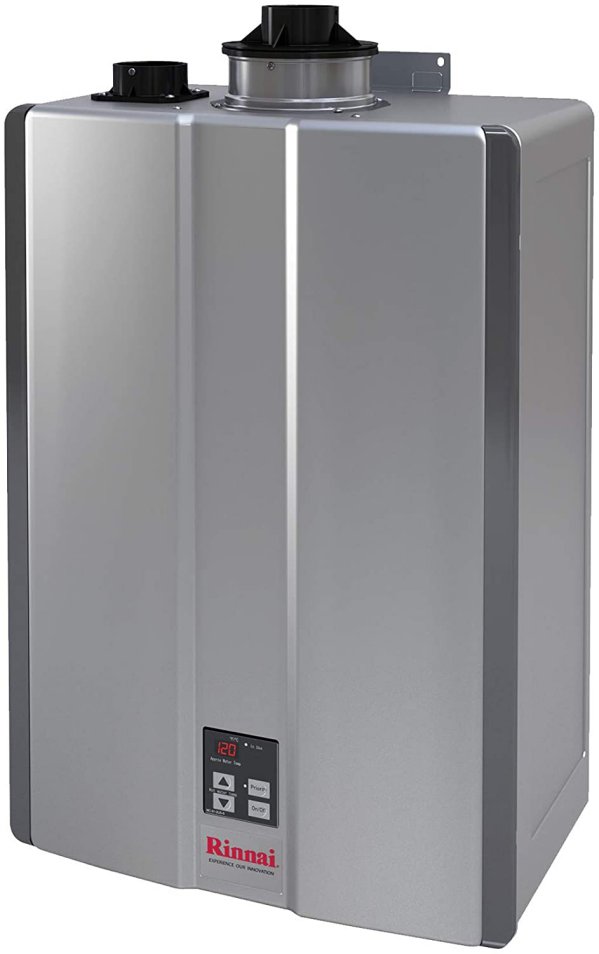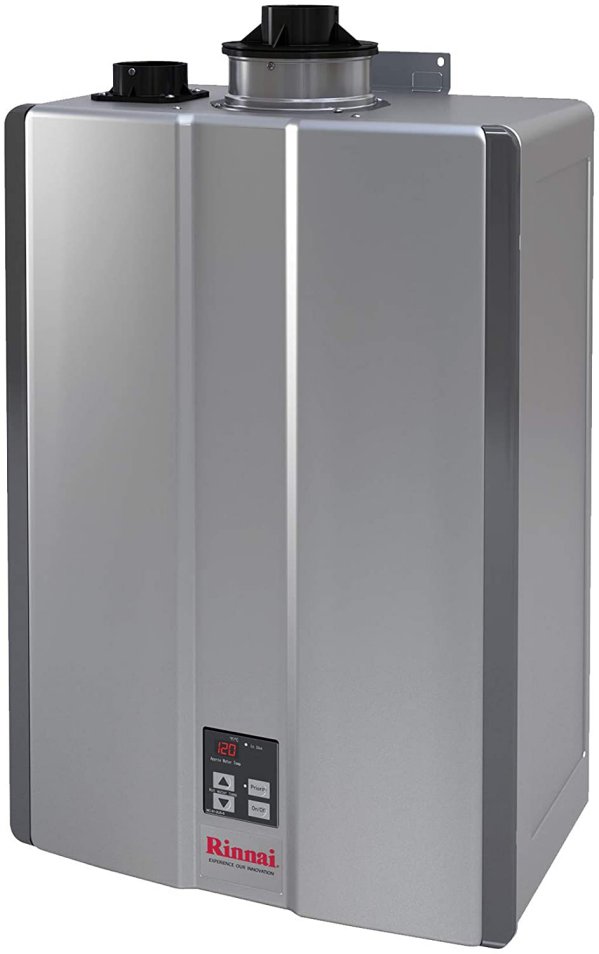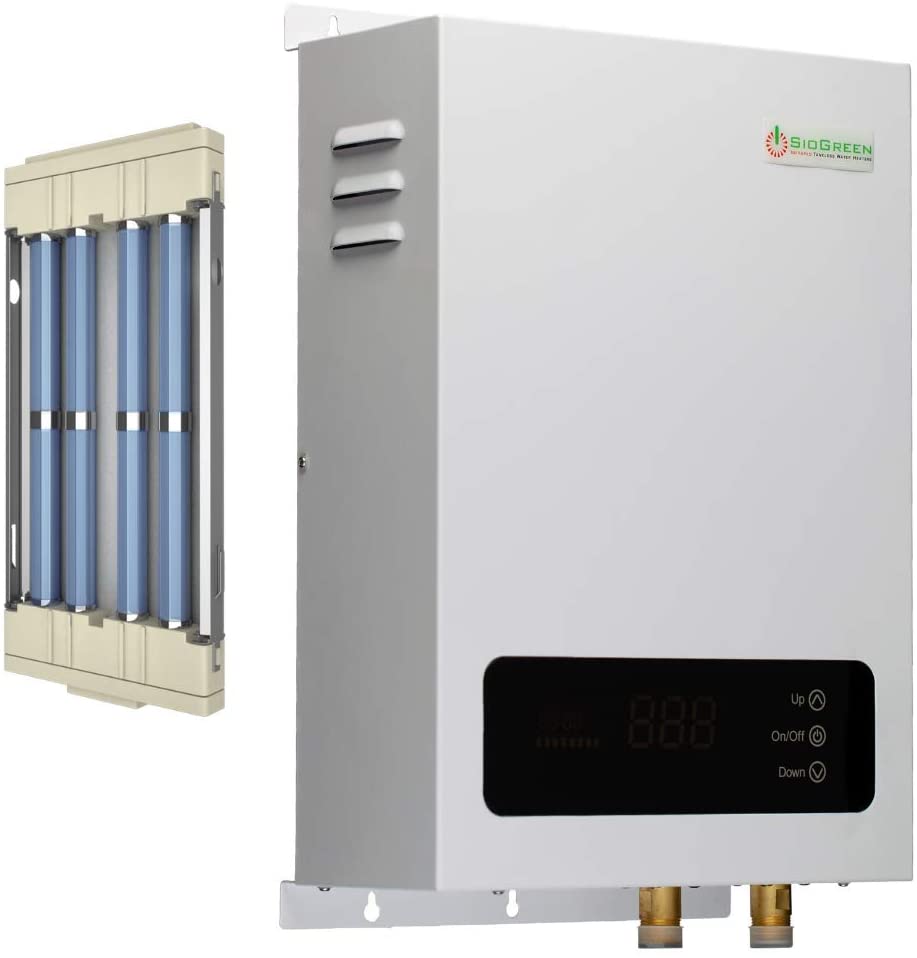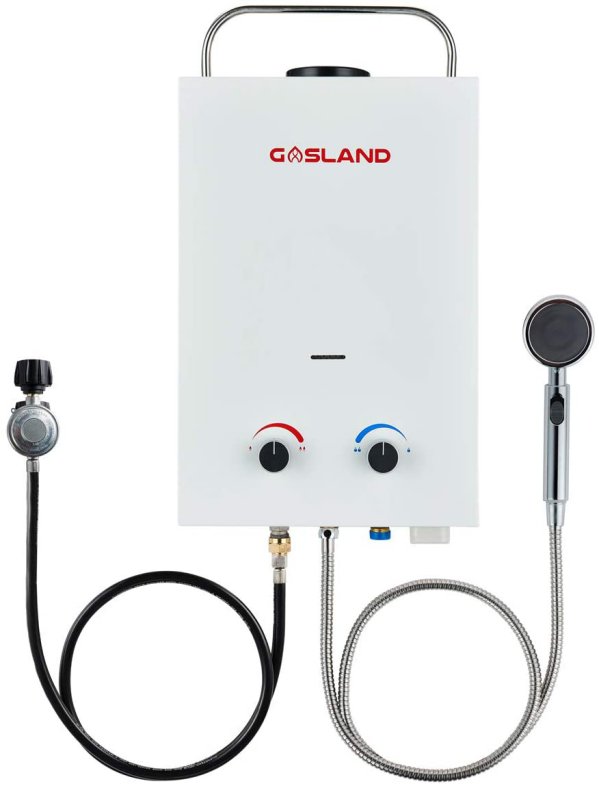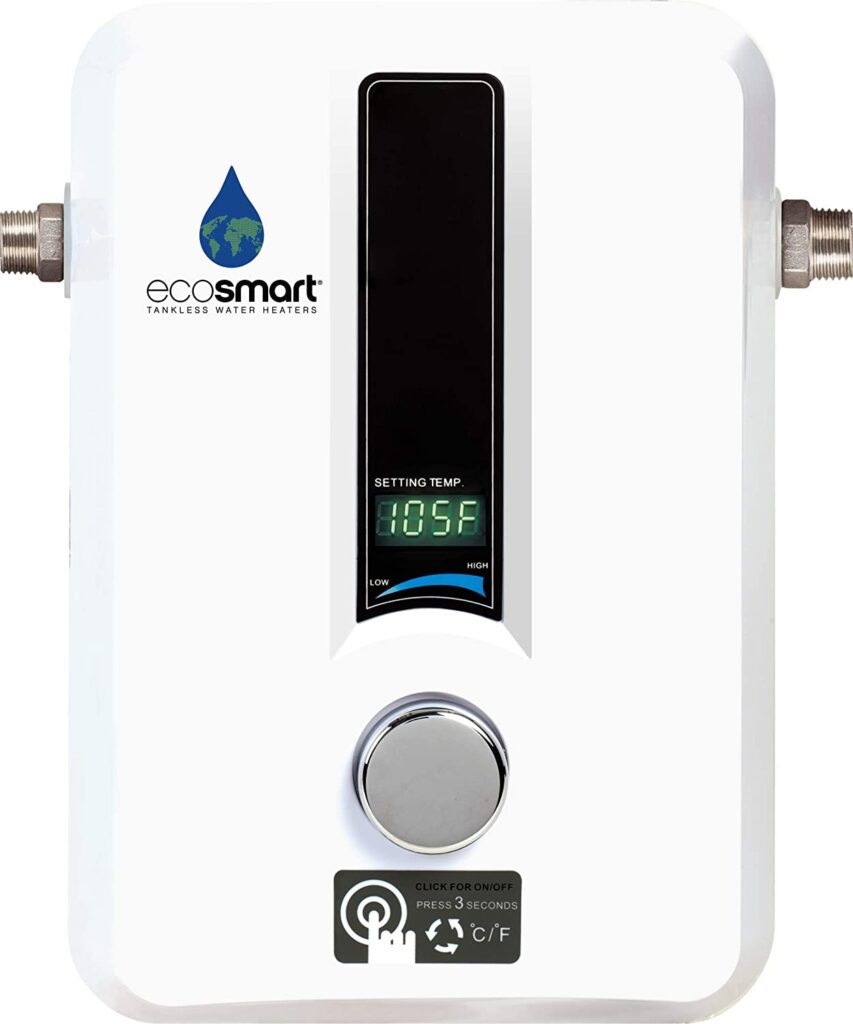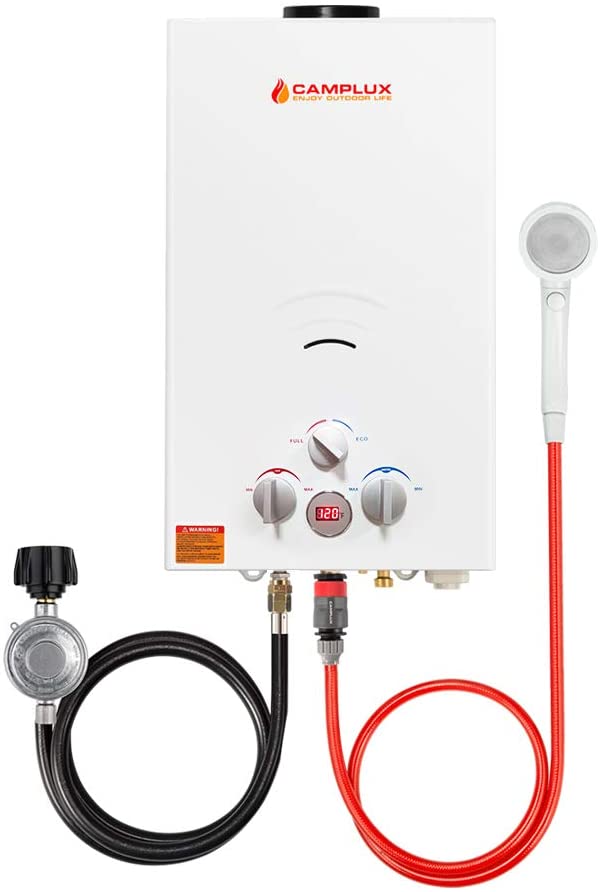For daily hot water needs, most people in the US rely on old-school and conventional water heaters with large tanks. But, there is an alternative to that, which can save you from many drawbacks of the traditional water heater and also supply you with limitless hot water.
They are tankless water heaters, and they are half the size of a refrigerator and can save you around 100$ to 120$ over the year. Besides, They heat the water only when needed; that’s why they are also known as on-demand water heaters.
They don’t come with a tank, so you won’t have to worry about the explosion, don’t require much maintenance, and they also last very long. Due to these many benefits, they are slowly gaining popularity in the market.
Now, if you want to make a switch from the conventional water heater, then it can be difficult due to its complex installation process and also due to its higher price. But the higher price tag is worth it once you realize its convenience and the ability to supply continuous hot water at all times.
Here is the list of the best tankless water heaters available in the market.
| Rinnai V65EP (Best Propane Tankless Water Heater)

|
| Rinnai V65EN (Best Natural Gas Tankless Water Heater)
          |
| Stiebel Eltron Tempra 24 Plus (Best Electric Tankless Water Heater)
          |
| Rinnai RU160iP (Most High-end & High capacity Propane Heater)
          |
| Rinnai RU160iN (Most High-end & High capacity Gas Heater)
          |
| Sio Green SIO18 (Most High-end & High capacity Electric Heater)
          |
| GASLAND BS158 (Cheapest yet Quality Propane Water Heater)
          |
| EcoSmart ECO 11 (Cheapest yet Quality Electric Water Heater)
          |
| Camplux BW264
          |
Table of Contents
Best Tankless Water Heater Reviews
1. Rinnai V65EN Outdoor Natural Gas Tankless Water Heater
Rinnai V65EN is the best tankless water heater for outdoor use, and it uses gas as fuel. This heater is a whole-house unit meaning it will serve all hot water needs for the house, from dishwashing to a shower.
This unit can supply up to 6.3 gallons per minute, depending on the temperature outside. If the outside temperature is colder, then you may get the flow rate anywhere from ranging 4 to 6 GPM.
The unit has a weight of just 48 pounds, which is quite nice for a gas unit. Besides, it has an energy factor of 0.82 along with a max BTU of 120,000. The energy factor means that out of the total energy used by a water heater, 82 % is converted to hot water.
What I find amusing about this water heater is its ability to fit onto the old gas lines and new gas lines, even if the gas pipe is 1/2-inch thick.
The interesting thing is you can connect your phone to the water heater by using wifi, and you can set the temperature. You can also schedule the temperature as you need, giving you the freedom from frequent manual changing of temperature.
Moreover, the unit comes with a 5-year limited warranty means you can invest your money in this unit without a doubt.
Read the Full Review of Rinnai V65iN Indoor Natural Gas Tankless Water Heater
What we like
- It is efficient.
- Maintenance and installation are very easy.
- It is a whole-house unit.
- Affordable.
What we don’t like
- Good for average-sized homes but not for large houses.
- It is an outdoor unit.
- Flow rate decreases in colder weather.
2. Rinnai V65EP Outdoor Propane Tankless Hot Water Heater
This is one of the best tankless water heaters which uses propane to heat the water and are installed outside only.
This tankless water heater is sufficient for small to medium-sized houses. You can use a warm water shower while the dishwasher is still running simultaneously in the kitchen. This is possible due to its high 6.5 GPM flow rate.
That being said, the unit has an energy factor of 0.82 along with a maximum BTU of 150,000 per hour.
An astounding feature of this unit is its enhanced scale and leak detection. If the circuitry inside the unit detects the leak, then it automatically shuts off the unit, preventing damage to the heater.
Plus, scale detection prevents scale build-up, so the unit doesn’t break due to the piling of scales.
What’s more, the unit comes with the Control-R 2.0 mobile app feature, which lets you set the timers and schedulers during the whole day and also enables you to put the system into vacation mode.
The installation of this unit is quite easy since it is an outdoor unit, but it needs to be installed by a professional otherwise, your warranty will be void.
Along with these features, the unit’s heat exchanger comes with a warranty of 10 years, 5 years on parts, and 1 year on labor.
Read the Full Review of Rinnai V65eP Outdoor Propane Tankless Water Heater
What we like
- Comes with a scale buildup and leak detection system.
- Compact in size.
- Easy installation.
- Complies with NOx emission regulations
- A temperature lock feature
What we don’t like
- Needs to be installed outside of the house.
- A professional is needed for the installation.
3. Stiebel Tempra 24 Plus Electric Tankless Water Heater
The Stiebel Eltron was founded in 1924, and since then, it became a respected brand in the water heater industry.
This tankless water heater comes with a perfect 1 GPM flow rate while having a 90-degree rise, which means for average use, it will provide you with the water at a 20-degree temperature rise with a GPM of 8. This means high-speed hot water continuously.
It is a 24 kW model that runs at 240V and needs a service that can supply 150 A.
The water heater features a digital temperature control unit to set the temperature at a precise level. Besides, the internal microprocessor makes sure that the temperature level is accurate and precise.
The temperature range you get is 80 to 140 Fahrenheit. Plus, the LCD panel will always display the current temperature of the water flowing out.
The most impressive thing about this water heater is its design, which is sleek and compact and weighs just one pound. The small dimension of the product makes the installation an easy process.
Unlike any other gas-based water heaters, this unit doesn’t have any ventilating needs, this is because the heater uses only electrical power, so there won’t be any harmful fumes that will need to be ventilated.
If we talk about the warranty then, the manufacturer offers a 7 years warranty on the internal components and 3 years on the heating element.
Read the Full Review of Stiebel Eltron Tempra 24 Plus Electric Tankless Water Heater
What we like
- No fluctuation in the temperature value due to digital control.
- No ventilation is required.
- The installation is simple.
- The energy efficiency is 99%.
- Has advanced flow control for better flow regulation.
What we don’t like
- Heavy-duty electrical service needs to be installed.
- Not suited for old houses.
- It is a little costly compared to other tankless water heaters.
4. Rinnai RU160iN Natural Gas Tankless Water Heater
This tankless water heater from Rinnai is best suited for indoor uses, and it is one of the most high-end products which uses gas as fuel.
This water heater has a BTU range of 15,000 (min) to 160,000 (max). For the proper use of this machine, you need a 1/2-inch gas line. With the default setting, the water temperature can be set from 98F to 120F.
The Water heater has a modern look to it, and it is also lightweight and compact, which will save valuable space in the house. For this unit’s installation, you will need to call a professional for assistance, and it is mandatory.
The uniqueness of this water heater is due to its whopping 92% energy efficiency; it is more than impressive. This energy efficiency brings it the certificate of ” Energy Star ”.
Another impressive feature of this water heater is its recirculation capability. This means no need to wait for the hot water to reach the faucet from the heater.
For recirculation to happen, you will need a dedicated return line, which is eliminated in this water heater, thanks to its ThermaCirc technology.
For convenience, it comes with the ‘Control R Wi-Fi Module’, which enables you to control the temperature of the water over wifi by using Rinnai’s mobile app. It is also compatible with smart assistants such as Amazon Alexa, Google Home, and Samsung SmartThings.
To boost your confidence, the manufacturer offers a warranty of 120 months on the heat exchanger, 12 months on labor, and 60 months for parts.
What we like
- Solid energy efficiency.
- You will get a tax rebate.
- The safety features are top-notch.
- Fast and simple to use.
- It is approved by SCAQMD as an Ultra-Low NOx water heater.
What we don’t like
- None.
5. Rinnai RU160iP Indoor Tankless Propane Hot Water Heater
This is the most reliable and cost-effective tankless water heater from the Rinnai, which uses propane as a fuel source. It will easily satisfy all hot water needs of small to medium-sized houses, and it can simultaneously supply enough hot water to 3 showers to take a bath with a constant flow rate.
The Fiber Mesh Premix Burner, with which the water heater is equipped, distributes the flame equally, which means the heater will provide the best performance possible. Plus, the water flow ranging from 0.26 to 8.0 GPM is provided with a maximum of 160000 BTU.
Thanks to this high energy transfer, you can get the water with a temperature variation from 98 F to 120 F. Besides, the design is compact and has a low weight, making it a good choice for indoor installation.
If you want to keep the warranty of the equipment intact, then you are going to need a professional to do the installation for you.
Moreover, the water heater is extremely efficient, and it has an energy constant of 0.92, which means 92% energy of the total energy used is converted into hot water. Due to its high energy efficiency, it possesses the “Energy Star” certificate for home appliances.
Besides its impressive performance, this tankless water heater comes with some unique features like a Wi-Fi module, recirculation capability without an extra pipe, isolation valves, and voice control.
This makes it the best indoor water heater to take care of your daily hot water needs, and don’t forget its impressive warranty package that offers a warranty of 120 months on the heat exchanger, 12 months on labor, and 60 months on parts.
What we like
- Easy to install
- Very good features.
- Best performance.
- Energy factor of 0.92.
- The warranty.
What we don’t like
- For installation, you will need a registered plumber.
- You will need to buy the Control-R module Separately.
6. Sio Green SIO18 Infrared Electric Tankless Water Heater
Sio Green SIO18 is the most advanced electric tankless water heater we have added to our reviews, and it is suitable for domestic use. This unit works with the electric supply of 240V and 80A.
It has an infrared working mechanism that means no direct contact with the metal tubes. There is no corrosion or limescale deposit and calcium buildup on the tubes, which makes it a fully maintenance-free tankless water heater.
This infrared technology the equipment uses to heat the water makes it different from other products in the market, and it may even feel like a next-gen product.
It uses the Quartz tubes for energy transfer, and with these tubes inside, you can get a high temperature inside the chamber, which in turn heats the water without any contact with the tubes. Besides, it is environmentally friendly and highly efficient.
With the use of this tankless water heater instead of the conventional heater with a tank, it can save you up to 60% energy per month, which will turn out to be quite a large saving because the product may last up to 10 years.
This water heater is an 18kW model that is capable of achieving a maximum flow rate of 6.6 GPM.
If we talk about the design, it has a simple but innovative and compact design to fit anywhere smartly, and they are also very easy to install. The compact size also makes it suitable to install at hotels or restaurants as well.
What we like
- No corrosion or any deposits on the tubes.
- Maintenance-free.
- Energy Efficient.
- It can be installed anywhere due to its small size.
What we don’t like
- A little heavy.
- Not capable of supplying the hot water simultaneously to two showers.
7. Camplux BW264 Portable Propane Tankless Water Heater
This is one of the cheapest propane tankless water heaters, ideal for outdoor use and campsite showers.
With Camplux 10L in action, you won’t have to worry about the abrupt water flow while taking a shower because it comes with a flow rate of 2.64 GPM, which is a little higher to get a decent shower with a consistent water flow. You can fill a tub or equally use it in a basin.
Other than that, it comes with the summer and winter modes, which change the hotness of the water based on the weather. If it is colder outside, you will get more hot water and relatively less hot water in warmer times.
You just have to select the right mode to get the perfect shower without having to adjust the temperature. This makes it more energy-efficient and saves around 11 to 12% of energy.
Besides, you will get an instant and endless supply of hot water wherever and whenever you want, thanks to its 68,000/hour of power output.
Not all water heaters in the market come with all the necessary things for installation, but this tankless water heater comes with everything that you will need like adapters, CSA-approved regulators, a showerhead, and tape and screws also.
What makes this water heater so unique is its safety features like flame failure device, anti-freezing protection, and overheating protection to have the best outdoor shower.
What we like
- It comes with all the necessary things.
- A digital dial for temperature control.
- Has a flame failure device.
- Lightweight, compact and portable.
- Affordable.
What we don’t like
- Fitting is not very strong.
- 20-minute runtime limit.
8. GASLAND BS158 Portable Gas Tankless Water Heater
This is one of the best outdoor-use tankless water heaters at an affordable price. With a power output of 41,000BTU/hour, it can provide you with a decent flow of water at a very high temperature.
This lightweight and compact water heater from the Gasland weighs just 14.9 pounds and uses gas as fuel. The water capacity of this water heater is 6L, which is enough to take a decent shower or wash dishes.
The great thing about this tankless water heater is its protection features like a flame failure device, and anti-freezing protection, which discharges the residual water from the heater when the temperature falls too low.
And it has overheating shut-off protection, which shuts off the gas supply if the temperature rises above 167 F.
For a proper flow of the water, it requires a pump with 2.18 PSI and will supply 1.58 gallons of hot water per minute. Moreover, The installation process for this water heater is very easy, and you won’t need a professional to do it for you.
Other than that, this water heater works on gas and 2D lithium batteries, which will save you the electricity bill and make it convenient to use outdoors where no electricity is available.
This will be a good investment if you want a decent outdoor water heater for camping or any other use. Also, it comes with a 1-year manufacturer’s warranty.
What we like
- Lightweight and compact construction.
- Anti-freeze protection.
- Installation is easy.
- Only needs 2.5 PSI pressure to properly work
What we don’t like
- It doesn’t come with a water pump.
- The quality of the accessories is not so good.
9. EcoSmart ECO 11 13KW Electric Tankless Water Heater
The EcoSmart presents an affordable and highly efficient ECO 11 electric tankless water heater. It has a compact design, making it very easy to install, and occupies very minimal space, although that minimal construction doesn’t compromise the water supply. Besides, the weight is just about 6.5 pounds.
The installation of this water heater is simple. Still, we recommend hiring a professional for a fitting, so you don’t void the warranty.
The heater features an automatic self-regulated thermostat that heats the water to the proper temperature by itself.
However, if you want to set the temperature manually, then you can change it from the smart digital display panel. The temperature can be set from the range of 80 to 140 degrees Fahrenheit.
The main highlight of this tankless water heater is its patented self-modulating technology. The main issue with any electric water heater is its continuous operation when not needed. Due to this, the electrical utility may serve you with hefty bills.
Having said that, it doesn’t waste any energy when it’s on standby mode because the self-modulating technology turns it off when there is no water flowing, resulting in a 99.8% efficiency. With this efficiency rating, you will be saving 50 to 60% on your electricity bills.
Along with all these features and performance parameters, the manufacturer offers a lifetime warranty, which is good.
What we like
- Self-modulating technology gives optimal performance.
- It’s compact.
- It provides a flow rate of 2 GPM.
- Easy to install.
- Lifetime warranty.
What we don’t like
- “Point of use design” doesn’t always work.
- For the warranty to be valid, you will need a professional to install this water heater.
How Does a Tankless Water Heater Work?


First, let’s see how the traditional water heater works. The traditional water heater has a storage tank in which the water is stored. The water heats up due to energy released from the burning of fuel.
That’s good, but when the hot water is not in use, the temperature goes down when it reaches a certain limit. The heater starts heating the water again, and this process keeps repeating as long as there is fuel. This is known as a standby loss.
In a tankless water heater, the standby loss is reduced to zero. Because it heats the water only when needed or when the tap is turned on.
The tankless water heater works with the heat exchanger, and it produces warm water when the tap is turned on. The cold water starts flowing through a pipe inside the unit.
The heat exchanger is an assembly of pipes from which this cold water flows and is heated by the burning of fuel like propane or gas. Besides these fuels, there are tankless water heaters available that work on electricity as well.
Due to this instantaneous heating of the water, these tankless water heaters will supply the constant flow of hot water, and you will not need to wait for the storage tank to fill up.
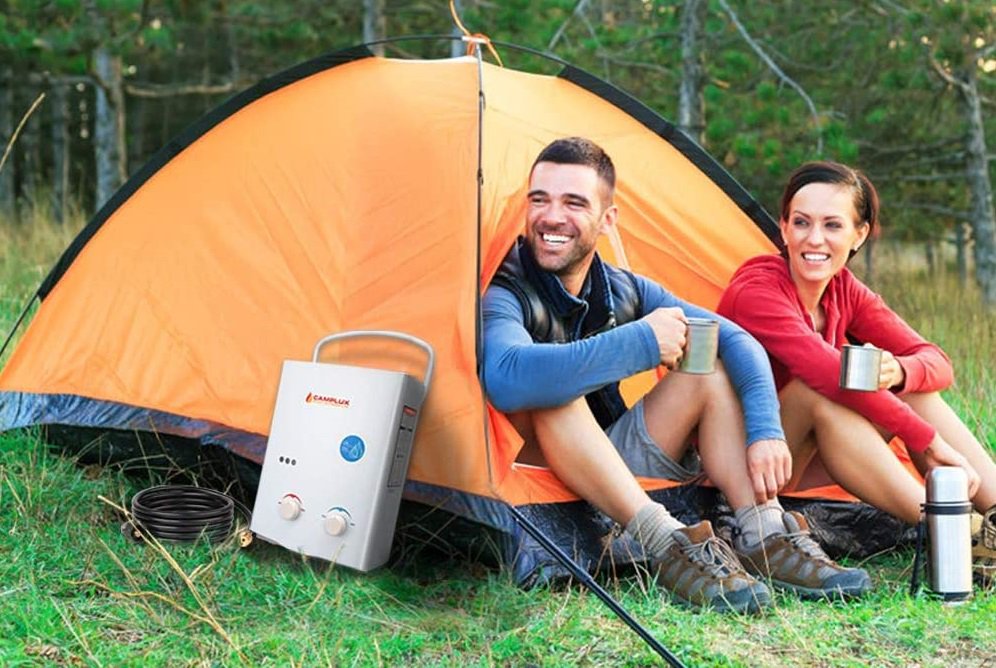

Types of Tankless Water Heating Systems
When you buy a tankless water heater, it is important to know exactly how many types of tankless water heaters are available in the market. So you can compare their offerings and working mechanisms, helping you make a proper choice based on your needs and budget.
1. Non-Condensing
These types of tankless water heaters are considered to be the first generation of the tankless era. They use a heat exchanger to heat the water, which in turn results in hot water at the faucet.
With this kind of arrangement, the heat exchanger provides an efficiency of around 0.82 to 0.85.
The reason behind the low efficiency is the hot exhaust. The exhaust released after passing over the water still contains the energy which goes to the surrounding atmosphere.
To let the exhaust flow outside, you will need an exhaust pipe that can withstand this kind of high temperature, like pipes made out of stainless steel. Due to the capability of these materials to withstand high temperatures, they are costlier.
The other drawback is that they are bulkier and provide very low efficiency for a short draw, like when you draw water from the faucet to wash hands. Besides, the heater itself is cheaper.
2. Condensing
These types of tankless water heaters are an improvement over the Non-condensing type. The use of a second heat exchanger is an improvement, which utilizes the remaining energy in the exhaust gases.
The exhaust fumes flow over water passing through a first heat exchanger; on their way out, they once again pass over the water flowing in a second heat exchanger before they are eventually released into the atmosphere. This kind of adjustment improves the energy factor of the water heater up to 0.92 to 0.94.
The temperature of the exhaust is now reduced after passing through the second heat exchanger, and it is relatively cold. That means you can use the less expensive PVC pipes for the exhaust system, which are available at cheaper rates.
But, the addition of the extra heat exchanger increases the cost of the unit. Moreover, the same as the Non-condensing water heaters, this type of heater also has a low efficiency when you draw water in small volumes.
3. Condensing Hybrid
The drawback of low efficiency on short water draw is eliminated in this type of water heater. You can consider them as the third generation of tankless water heaters for simplicity.
As the name suggests, these models are hybrid; they feature a small tank inside, which acts as a reservoir for the hot water. The tank size of this reservoir can be anywhere between 1 liter to 2-gallon. The reason behind the inclusion of this tank is to supply hot water when someone needs water in a small volume and not consistently.
This kind of tankless water heater generally has an energy factor ranging from 0.92 to 0.96.
4. Point of Use (POU)
When using the central water heater, the fraction of heat is lost on its way to the water faucet. These “Point of Use” water heaters eliminate the distribution of heat loss if the house is large.
They provide better energy efficiency because the water is the heated closest point where the hot water will be utilized. If you need hot water for the shower, these water heaters are placed as close as possible to place them near the bathroom.
These are a good option for large houses as the water can take up to several minutes to reach the point of use if it is supplied by the central heater.
How Do I Pick the Right Tankless Water Heater?
It is crucial that you understand different things associated with tankless water heaters because selecting the one which best suits your needs from the many in the market is not going to be an easy task.
Fuel type
The tankless water heaters generally use 3 energy sources to heat the water: natural gas, propane, and electricity. They differ from each other in terms of their price and heating capability; they each have their own pros and cons, so choose wisely.
-
Natural Gas
The operating cost of this type of tankless water heater will be less than that of propane and electricity both. The natural gas units are costlier, but the low cost of natural gas can make up for it in long-term usage.
Besides, to work properly, they need a continuous supply of gas, which is available in many households through a pipe. If not, then the installation of the pipe will be time-consuming as well as costly. Also, for installing the water heater and the exhaust system, you will need to hire a professional, which will further increase the cost.
That being said, this kind of system will require periodic maintenance for the long life of the unit.
Natural gas can’t be stored easily, so if you are planning to use it outdoors, then think again before buying the natural gas water heater.
-
Propane Gas
The main difference between propane and natural gas is that propane can’t be supplied through a pipe to the home. Propane is generally available in a cylinder, so when the cylinder is empty, you will need to fill it again.
This is why propane-powered water heaters are generally not suitable for home use, but they are a good choice for outdoor use like an RV or a supply of hot water at a campsite. Besides, propane is the most expensive gas.
Electricity
The water heaters powered by electricity have less initial investment. They are easy to install too, and you won’t have to spend much on their installation procedure.
The most noticeable thing about the electric water heater is its efficiency; some even offer an efficiency of up to 99%. But, they are not as powerful as gas-powered heaters; they supply the water with lower flow rates.
That being said, these models are sleek and compact in design and need very little space, so you can mount them anywhere you want.
Some of them will have a high power requirement, which the older homes might not meet then you will need a costly electrical system upgrade.
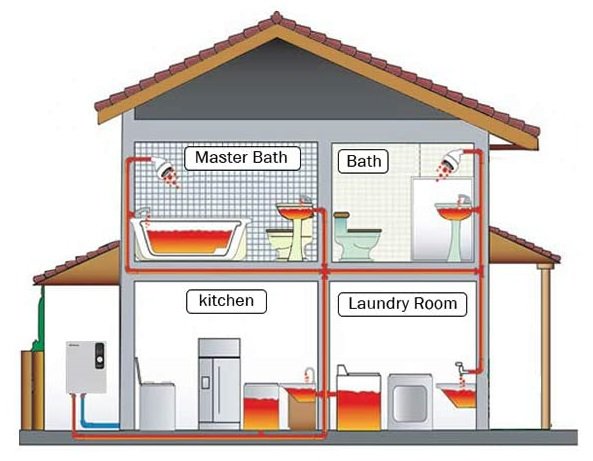

Flow Rate
The main consideration when buying the tankless water heater should be its flow rate. It is measured in GPM means “Gallons Per Minute.” The flow rate depends on the house and the use of hot water simultaneously for different tasks.
The flow rate of the water heater changes based on the temperature range. For instance, one water heater will be supplying the water at a rate of 4 GPM if it raises the water temperature by 90 degrees, while the same water heater can supply the water at an 8 GPM if the temperature rise is just 10 degrees.
For a medium-sized house, we recommend that you buy a water heater that can supply the hot water with at least 7 GPM when increasing the temperature by 60 degrees if you want to run the 2 showers and a dishwasher at the same time and the outside temperature is not so cold.
Venting
Venting is a consideration if you are picking gas-fired tankless water and that too for indoor use. For outside heaters, there is no need for venting.
Venting is necessary for the proper functioning of the unit, and the cost of the venting pipes will depend on the type of tankless water heater. If it’s a non-condensing type, then the venting system will be costlier, while for the Condensing type water heaters, the venting system can be installed on a less budget.
Also, choose the venting category that provides the better combustion of the fuel like the Category III venting system.
Traditional vs Tankless
Traditional water heaters are generally known as tank water heaters, and these water heaters are available for decades. They come with the tank in which the water is stored, and it is continuously kept at the desired temperature, that’s why this type of water heater works around the clock, even when the water is not in use.
Moreover, the water storage tank can range from 30 to 50 gallons in size, and those aren’t small tanks, but they occupy a considerable space wherever you store them; that’s why they are generally kept in a garage or the basement.
If we talk about tankless water heaters, then as their name suggests, you won’t need a tank to store the water, unlike the tanked water heaters it will never run out of hot water as long as you have enough cold water.
This is because they heat the water as it is required at the outlet, so intermittent operations reduce the operating cost. They are compact in design and light in weight, but that doesn’t mean you can mount them anywhere you like. These are the newer water heaters, and they will save you some bucks over the long run.
Cost of Installation
The tankless water heaters are going to cost you more compared to tanked water heaters not only in initial investment but also in installation as well. The installation and initial costs are around twice that of a conventional water heater costs.
In comparison, the gas fire system can cost even more due to ventilating needs.
These high costs of the tankless system can be justified by considering its long-term use, and they are more energy-efficient than standard water heaters. Besides, the tankless system requires very little maintenance, and this means it is good for a long-term investment.
It will be good to invest a little more and get a reliable and efficient system.
Energy Efficiency
The efficiency of the water heater indicates the total amount of energy that is actually utilized to raise the temperature of the water. Also, efficiency determines the flow rate; high efficiency means a high flow rate at high temperatures.
The efficiency will also determine the energy costs too. The efficiency of tankless water heaters, depending on their type, can range from 75% to 99%.
When the energy is supplied to the water heater, some part of the energy goes to waste, which is of no use to us. So, consider a water heater which offers higher efficiency.
Advantages and Disadvantages of Tankless Water Heater


Tankless water heaters have many good things about them, but there are a few disadvantages to them as well.
Advantages
Energy Efficient :
The tankless water heaters don’t work continuously, which makes them more energy-efficient. You will save from 30 to 35 % on energy costs resulting from the use of a conventional water heater. The efficiency of tankless water heaters can range from 75 to as high as 99%.
The water heaters that have an efficiency of more than 95% get an Energy Star rating, which saves more energy each year.
Can Be Installed Anywhere :
They don’t need to store the water because they supply the water, which is instantly heated. This makes them small and compact, and the small size enables you to store them almost anywhere you want. You can keep them inside, or you can hang them on the wall outside of your house.
Reliable :
In the case of conventional water heaters, you might need to wait for some time if all the hot water inside the tank is utilized. But tankless water heaters supply a sufficient amount of hot water without any interruption. Here you will never run out of hot water; it will keep supplying the hot water at a constant temperature.
Continuous Hot Water at Multiple Outlets:
These compact tankless water heaters are capable of delivering continuous hot water to multiple outlets in the house. They can supply enough hot water to the shower and dishwasher simultaneously without any interruptions.
Safety :
Almost all modern tankless water heaters come with many safety features to protect the people and the unit itself, like, if the temperature of the unit raises above a certain limit, then the water heater will turn itself off.
Disadvantages
High Initial Cost :
Tankless water heaters are costlier than conventional water heaters, and this high cost can be compensated if you take the yearly energy saving, less maintenance, and longer lifetime into account.
High Installation Cost :
Besides the initial cost, they are also costly to install. You will need a professional to do the installation for you. In the case of gas water heaters, you will need a ventilating system if the heater is mounted indoors, which will further increase the cost. While the electric water uses a heavy-duty electrical supply, if it’s not available, then you will need a costly upgrade.
Issues in Bigger Households :
The tankless water heaters are good to have unlimited hot water, but for the larger household, it might not be able to supply sufficient water for simultaneous needs. If you need hot water at more than 3 outlets, you might not get the desired result in terms of the water flow at a certain temperature.
How to Select the Right Size of Tankless Water Heater?
The selection of the right size water heater is critical. If you buy a small water heater, then it may not be able to fulfill all hot water demands in the house, and if it is too large, then you will end up spending more money.
So, it is important that you determine the size of the water heater for your needs. To determine the right size for the tankless water heater, there are generally 2 to 3 steps involved in the process, which are explained below.
Figure Out The Right Flow Rate :
The tankless water heaters don’t have a storage tank, which means they heat the water as it flows to the outlet. That raises a question, how much water flow will it be able to supply if the 2 or more hot water outlets are turned on simultaneously?
So to get the water heater that can simultaneously supply all your hot water needs, you will need to determine how much flow for simultaneous use of every faucet will be required. This flow rate is measured in GPM, which stretches into ” Gallons Per Minute.”
Consider this; an average shower outlet requires 1.8 GPM of water flow, then if two showers are turned on together, the total flow rate that the water heater will need to supply will be 1.8 + 1.8 = 3.6 GPM.
Besides these showers, there may be faucets or taps that will also be turned on, so you will also need to add them to the total, and the water heater should be able to supply that total GPM.
After calculating the total flow rate, you can add 1 or 2 GPM extra to supply the hot water in an emergency need of hot water.
Consider the Needed Temperature Rise :
After determining the flow rate, another thing you will need to do is to calculate the temperature rise of the water. The water you supply to the inlet will be at some temperature, and you want to heat this water to some temperature level. To raise the temperature level of the water, the heater will need to supply more heat.
Suppose the water flowing inside the water heater has a temperature of 45°F and you want the hot water at a temperature of 110°F. So, the heater will need to increase the temperature of the water by 65°F.
This means that if your shower runs with a flow rate of 2.0 GPM, then it is essential that the water heater heats the 2 gallons of water by 65 degrees every minute to get the desired temperature.
The important thing is the water temperature will be different in different states of the US, so if you don’t know the water temperature, then it will be safe to assume a lower incoming water temperature just to be on the safe side.
The Installation Parameters :
One more important thing to consider is the actual physical size of the water heater. The right tankless water heater will vary substantially based on the size of the house and space available to install it and also on the decorative concerns for the house.
There are heaters available in the market which are so compact that they can fit inside a small closet and the bigger ones which you can’t hide even if you try. So, you will need to make a wise choice here.
Electric vs Gas Tankless Water Heater – Which One to Choose
The main difference between electric and gas-powered tankless water heaters is their output ratings. The gas water heater provides more energy than the electric water heaters can, but this high power rating costs you more than the electric modes.
That being said, the electric models don’t require frequent maintenance, but the gas-powered ones do, so their operating cost is going to differ.
In fact, due to the low power output of the electric water heater, it is used in small homes or offices to supply hot water to a single faucet at a time.
So, for large households, the gas water heaters will be suitable, while for small households where the hot needs are low the electric water heater can do the job.
FAQs
Q. What is a tankless water heater?
As their name suggests they don’t have a tank to store the water, it will heat the water as it will come. That’s why they are also known as instant flow or on-demand water heaters. With the tankless water heater, you will have an endless supply of hot water.
Due to the absence of the tank, they are lightweight and compact and can be stored anywhere, and they are also energy efficient.
Q. How long will the tankless water heater last?
You can expect a very long service period from these tankless water heaters, and they last very long. Just to give an estimate of their life expectancy, it can vary from 10 years to 25 years. I think that is long enough to get the return of your invested money.
The lifespan will also depend on the installation configuration and usage of the heater. If you use quality water and it is properly installed, then it will last for more than two decades. To get this much longer life, there is one thing that you will need to ensure is its regular maintenance.
Q. Can I install a tankless water heater on my own?
Yes, you can but we don’t recommend you to do that. Most tankless water heaters will need to be installed by a certified professional, and if you don’t do that, you will void the warranty on the product. Also, while doing a manual installation, there is a high chance that you may damage the heater.
Besides, there are other complications involved in installing tankless water heaters like venting system installation and electrical system configuration, etc.
Q. How much tankless water heater saves in energy cost every year?
The tankless water heater water will save you around 20 to 30 % if you use a conventional water heater. However, it mainly depends on how much hot water you are using and the price of electricity or gas to run the heater. Whether you save money or not, one thing is clear you will always have a constant hot water supply.
Q. Is it true that you cannot install some tankless water heaters in certain areas?
Yes, it is true. In some states and cities, you can’t install specific models of water heaters. They don’t permit the installation due to several reasons. Therefore it will be better if you first consult the local authorities before buying the heater.
Besides, some tankless water heaters don’t come with a return policy like 3-phase or deionized heaters. I believe in the end, you won’t like to be stuck with the water heater, which you can’t install due to local codes or can’t return.
Related Articles:
Best Reverse Osmosis Systems of 2024 | Reviews & Buying Guide
